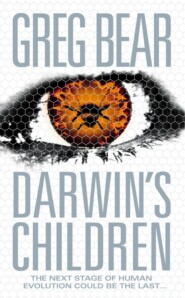По всем вопросам обращайтесь на: info@litportal.ru
(©) 2003-2024.
✖
Darwin’s Radio
Настройки чтения
Размер шрифта
Высота строк
Поля
Kim threw her hands up in the air. ‘Christ, Kaye, maybe you could use all the publicity to take the company public, get some funding. Tide us over for another year …’
Kim had very little sense of how business worked. She was atypical this way; most biotech researchers in private companies were very savvy about business. No francs, no Frankenstein’s monster, she had heard one of her colleagues say. ‘We couldn’t convince anybody to back us for a public offering,’ Kaye said. ‘SHEVA has nothing to do with EcoBacter, not now at any rate. And cholera is Third World stuff. It isn’t sexy, Kim.’
‘It isn’t?’ Kim said, and fluttered her hands in disgust. ‘Well, what in hell is sexy in the big old bidness world today?’
‘Alliances and high profits and stock value,’ Kaye said. She stood and tapped the plastic panel near one of the mouse cages. The mice inside reared up and wriggled their noses.
Kaye walked into Lab 6, where she did most of her research. She had handed off her bacteriocin studies a month ago to some postdocs in Lab 5. This lab was being used by Kim’s assistants for the time being, but they were at a conference in Houston, and the lab had been closed, the lights turned off.
When she wasn’t working on antibiotics, her favorite subjects had been Henle 407 cultures, derived from intestinal cells; she had used them to meticulously study aspects of mammalian genomes, and to locate potentially active HERV. Saul had encouraged her, perhaps foolishly; she could have focused completely on the bacteriocin research, but Saul had assured her she was a golden girl. Anything she touched would advance the company.
Now, lots of glory, but no money.
The biotech industry was unforgiving at best. Maybe she and Saul simply did not have what it took.
Kaye sat in the middle of the lab on a rolling chair that had somehow lost a wheel, leaned to one side, hands on her knees and tears slicking her cheeks. A small and persistent voice in the back of her head told her that this could not go on. The same voice continued to warn her that she had made bad choices in her personal life, but she could not imagine how she could have done otherwise. Despite everything, Saul was not her enemy, far from being a brutal or abusive man; he was simply a victim of tragic biological imbalances. His love for her was pure enough.
What had started her tears was this treasonous inner voice that insisted that she should get out of this situation, abandon Saul, start over again; no better time. She could get work in a university lab, apply for funding for a pure research project that suited her, escape this damned and very literal rat race.
Yet Saul had been so loving, so right when she had returned from Georgia. The paper on evolution had seemed to rekindle his interest in science over profit. Then … the setbacks, the discouragement, the downward spiral. Bad Saul.
She did not want to face again what had happened eight months ago. Saul’s worst breakdown had tested her own limits. His attempted suicides – two of them – had left her exhausted, and, more than she cared to admit, embittered. She had fantasized about living with other men, calm and normal men, men closer to her own age. Kaye had never told Saul about these wishes, these dreams; she wondered if perhaps she needed to see her own psychiatrist, but she had decided against it.
Saul had spent tens of thousands of dollars on psychiatrists, had gone through five regimens of drug therapy, had once suffered complete loss of sexual function and weeks of being unable to think clearly. For him, the miracle drugs did not work.
What did they have left, what did she have left in the way of reserves, if the tide turned again and she lost Good Saul? Being around Saul in the bad times had eaten at some other reserve – a spiritual reserve, generated during her childhood, when her parents had told her, You are responsible for your life, your behavior. God has given you certain gifts, beautiful tools …
She knew she was good; once, she had been autonomous, strong, inner-directed, and she wanted to feel that way again.
Saul had an outwardly healthy body, and intellectually a fine mind, yet there were times when, through no fault of his own, he could not control his existence. What then did this say about God and the ineffable soul, the self? That so much could be skewed by mere chemicals …
Kaye had never been too strong on the God thing, on faith; the crime scenes in Brooklyn had stretched her belief in any sort of fairy tale religion; stretched it, then broke it.
But the last of her spiritual conceits, the last tie she had to a world of ideals, was that you controlled your own behavior.
She heard someone come into the lab. The light was switched on. The broken chair squeaked and scraped as she turned. It was Kim.
‘Here you are!’ Kim said, her face pale. ‘We’ve been looking all over for you.’
‘Where else would I be?’ Kaye asked.
Kim held out a portable lab phone. ‘It’s from your house.’
CHAPTER EIGHTEEN Atlanta, the CDC (#ulink_8f369586-c6d8-5218-be7c-5898f8aaa9c6)
Вы ознакомились с фрагментом книги.
Приобретайте полный текст книги у нашего партнера:
Приобретайте полный текст книги у нашего партнера:









